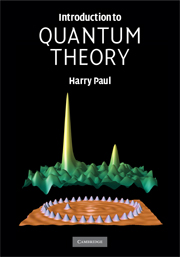7 - Conservation laws
Published online by Cambridge University Press: 04 June 2010
Summary
As in classical physics, also in quantum mechanics: physical processes are bound to obey conservation laws. However, there is an important difference. While in classical physics we can suppose that all variables have definite values (irrespective of whether we know them or not), quantum mechanics allows them to be intrinsically uncertain. In those cases conservation laws apply only to ensemble averages (expectation values), and hence are less informative. They show their full strength in measurement processes. Then the measured values satisfy the respective conservation laws in any individual experiment. Let me remind you of spin measurements on a system of two spin-½ particles, being in a state with zero total spin, which we used in Section 5.5 to illustrate the EPR paradox. The spin components, with respect to an arbitrarily chosen direction, of the two particles are indefinite; however, measuring them yields definite values (+½ or −½) that add up to zero, thus confirming the angular conservation law.
In the following, we will consider some realistic experiments for which conservation laws provide a simple explanation.
Energy and momentum conservation
For an understanding of the interaction between matter and radiation, Einstein's photon concept (actually, he spoke of ‘light quanta’) proved to be very helpful. He assumed photons to be particle-like constituents of electromagnetic radiation, in particular light. They have the energy hν, where ν is the frequency of the radiation field. (Since the electromagnetic spectrum extends over an extremely wide range, there is a huge number of different sorts of photons.) The crucial point is that photons are generated or annihilated only as a whole. This property gives rise to typical quantum effects.
- Type
- Chapter
- Information
- Introduction to Quantum Theory , pp. 124 - 129Publisher: Cambridge University PressPrint publication year: 2008



